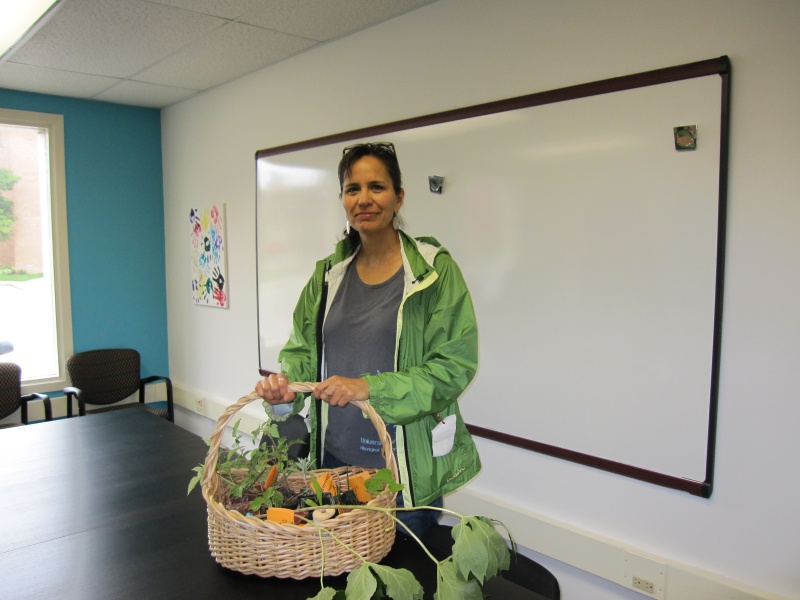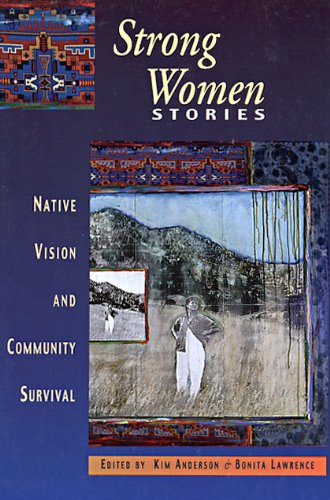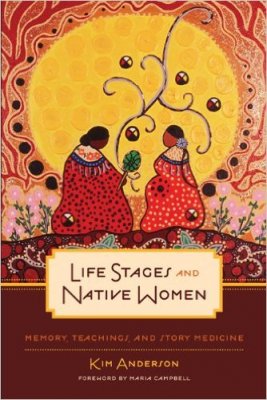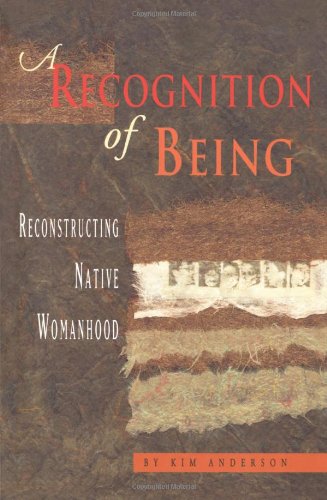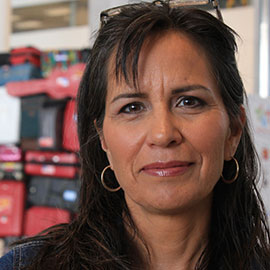
Media
What does it mean to be an indigenous man?
CBC News, March 19, 2015Online
URL: http://www.cbc.ca/news/aboriginal/what-does-it-mean-to-be-an-indigenous-man-1.3498212
"Maybe it's time to think through, to be able to build healthier communities as a result of what we know about... the sacredness of men and masculinity," said editor Kim Anderson, who is a Cree and Métis educator and professor at Wilfrid Laurier University...
Strengthening the heart: Residential school survivor uses his art as a healing tool
The Record, May 14, 2016Online
Last year, Meshake and Bruder attended a conference in Barcelona with Kim Anderson, associate professor of indigenous studies at Laurier Brantford. Meshake gave a presentation about language and art and performed with his flute...
Prime minister statues have no place on our campus
The Toronto Star, October 29, 2015Online
Ah, Halloween — that time of year when ghosts come out and white folks dress up as Indians. So this year, some of us Indians decided to join in and dress up as Indians too. No doubt I would look great in one of those off-the-shelf “Pocahottie” bimbo costumes. But since I am an Indigenous historian working in Canada, I decided I would go as Big Bear and invite my colleague to be Poundmaker...
An act of genocide: Canada's forced sterilization of First Nations women
Intercontinental Cry, December 17, 2015Online
URL: https://intercontinentalcry.org/canadas-coerced-sterilization-of-first-nations-women/
Dr. Kim Anderson, Cree/Métis writer and fellow Wilfrid Laurier professor who specializes in community engaged research in Indigenous communities, supported Dr. Stote’s statement in a phone conversation with IC. “Genocide is the term for [these] systematic strategies. The ultimate end of sterilization is that people are unable to have children and that’s genocide.”...
This collection of seventeen essays presents original and critical perspectives from writers, scholars and activists on issues that are pertinent to Aboriginal women and their communities in both rural and urban settings in Canada. Their contributions explore the critical issues facing Native women as they rebuild and revive their communities. Through topics such as the role of tradition, reclaiming identities and protecting Native children and the environment, they identify the restraints that shape their actions and the inspirations that feed their visions.The contributors address issues of youth, health and sexual identity; women's aging, sexuality, and health; caring for children and adults living with Fetal Alchohol Syndrome; First Nations education and schooling; community-based activism on issues of prostitution and street workers; and reclaiming cultural identity through art and music.About the Editors: Kim Anderson (Cree/Metis) is a writer and educator who works in social and health policy development as a researcher/writer for Aboriginal organizations in Ontario. Bonita Lawrence (Mi'kmaw) is Assistant Professor at Atkinson College School of Social Sciences, York University.
University of Manitoba Press
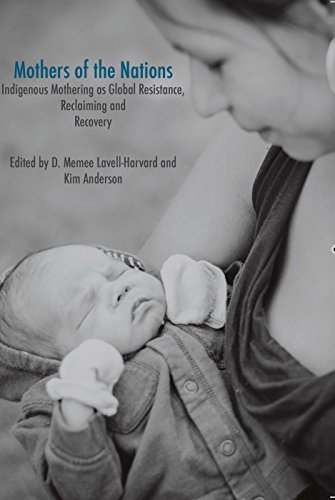
Mothers of the Nations: Indigenous Mothering as Global Resistance, Reclaiming and Recovery
by Dawn Memee Lavell-Harvard and Kim Anderson
Demeter Press
1927335450
The voices of Indigenous women world-wide have long been silenced by colonial oppression and institutions of patriarchal dominance. Recent generations of powerful Indigenous women have begun speaking out so that their positions of respect within their families and communities might be reclaimed. The book explores issues surrounding and impacting Indigenous mothering, family and community in a variety of contexts internationally. The book addresses diverse subjects, including child welfare, Indigenous mothering in curriculum, mothers and traditional foods, intergenerational mothering in the wake of residential schooling, mothering and HIV, urban Indigenous mothering, mothers working the sex trade, adoptive and other mothers, Indigenous midwifery, and more. In addressing these diverse subjects and peoples living in North America, Central America, Sub-Saharan Africa, the Philippines and Oceania, the authors provide a forum to understand the shared interests of Indigenous women across the globe.
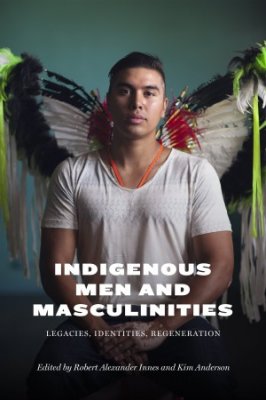
Indigenous Men and Mascultinities: Legacies, Identities, Regeneration
by Robert Alexander Innes, Kim Anderson
University of Manitoba Press
Sumach Press
November 28, 2001
1894549120
Kim Anderson has written a critical and inspiring history of Native womanhood. Anderson traces the construction of the negative female stereotypes forced on Native women during colonization. Through interviews with forty contemporary Native women across Canada, she explores the issues shaping their lives and the many ways they are reclaiming positive and powerful images of themselves.
Traditional and Indigenous Knowledge
Published by The Wiley Blackwell Encyclopedia of Gender and Sexuality Studies
2016 Traditional indigenous societies were gendered in terms of roles and responsibilities for men and women. This was determined according to physical capacity and what males and females could contribute toward the survival of people in these land- ...
URL: http://onlinelibrary.wiley.com/doi/10.1002/9781118663219.wbegss118/full
Notokwe Opikiheet- "Old-Lady Raised": Aboriginal Women's Reflections on Ethics and Methodologies in Health Research
Published by Canadian Woman Studies
2008 Research into the health of First Nations, Métis and Inuit Peoples in Canada is of increasing interest and concern, and has been the locus of much activity in recent years. At the core of this emerging research agenda is dialogue around appropriate methodologies and ethical considerations...
URL: http://search.proquest.com/openview/4bba01024ba997c06de40f8c23cbea43/1?pq-origsite=gscholar
Leading by action: Female chiefs and the political landscape
Published by Restoring the balance: First Nations women, community and culture
2009 The ultimate show of sovereignty is taking responsibility to make your own decisions. At the same time you also have to take responsibility for the consequences. I think that it is going to have to be the women that take that message forward. We have the role of keeping the ...
Indigenous masculinities: Carrying the bones of the ancestors
Published by Canadian men and masculinities: Historical and contemporary perspectives
2012 The meeting room in downtown Toronto has about 20 Indigenous men and a handful of women seated facing each other around long tables. They are here to take part in a provincial training program, Kizhaay Anishinaabe Niin (Ojibway phrase that translates to “I ...
Biography
Kim Anderson is Associate Professor and Tier II Canada Research Chair in Indigenous Relationships in the Department of Family Relations & Applied Nutrition at the University of Guelph. Her popular book, A Recognition of Being: Reconstructing Native Womanhood (Women's Press/CSPI, 2000), was published as a second edition. She is also the author of Life Stages and Native Women: Memory, Teachings and Story Medicine (University of Manitoba Press, 2011), and is the series co-editor for the Women and Indigenous Studies Series at UBC Press. Anderson has co-edited books on Indigenous women and activism, Indigenous mothering and Indigenous men and masculinities. She is the author of over thirty book chapters and journals articles; her research interests lie in the areas of health and well-being of Indigenous families, gender and Indigenous peoples, community-based Indigenous research, oral history and Indigenous knowledge translation, and Indigenous environmental knowledge. Anderson is a long-standing advocate for Indigenous women and families and is regularly involved in community-based research and teaching in this area. She has also worked for fifteen years as a consultant on social and health policy for Indigenous communities and organizations.
Recognition/Reconnaissance
Early Researcher Award Province of Ontario | Professional
This is an award that will facilitate a research project entitled "Indigenous Knowledge Transfer: Gender and Life Stage Factors in Indigenous NGO Management."
Research Grants
Indigenous Knowledge Transfer in Urban Aboriginal Communities
Organization: SSHRCDate: August 19, 2016
Grant amount: $329,085
Details:
This study explores how urban Indigenous communities articulate mechanisms and obligations for Indigenous knowledge transfer. The role of urban Indigenous institutions are examined through methods which include concept mapping, symbol analysis, storytelling, principles of reflexivity (including observational and experiential learning), intergenerational narratives, and Indigenous teachings.
Indigenous Knowledge Transfer: Gender and Life Stage Factors in Indigenous NGO Management
Organization: Province of Ontario, Early Researcher AwardDate: August 19, 2016
Grant amount: $150,000
Details:
This research will increase understanding of Indigenous NGO culture-based management models and in particular the role of gender and age in Indigenous NGO development. A primary deliverable will be the documentation of the role of knowledge transfer through intergenerational collaboration and gender equity in the development of a large urban Indigenous NGO, the Ontario Federation of Indigenous Friendship Centres, as well as in three member Friendship Centres.
Biidwewidam Indigenous Masculinities
Organization: SSHRC Partnership GrantDetails:
The Biidwewidam Indigenous Masculinities (BIM) project is committed to building research capacity around Indigenous masculinities and identities with the intent of contributing to the health and wellness of Indigenous communities and peoples. This project is a collaborative effort, between Aboriginal organizations, scholars working in Canadian Universities, and Indigenous communities. It is funded by the Social Sciences and Humanities Research Council of Canada (SSHRC) and the Ontario Federation of Indian Friendship Centres (OFIFC). Community partners include the OFIFC and the Native Youth Sexual Health Network (NYSHN).


